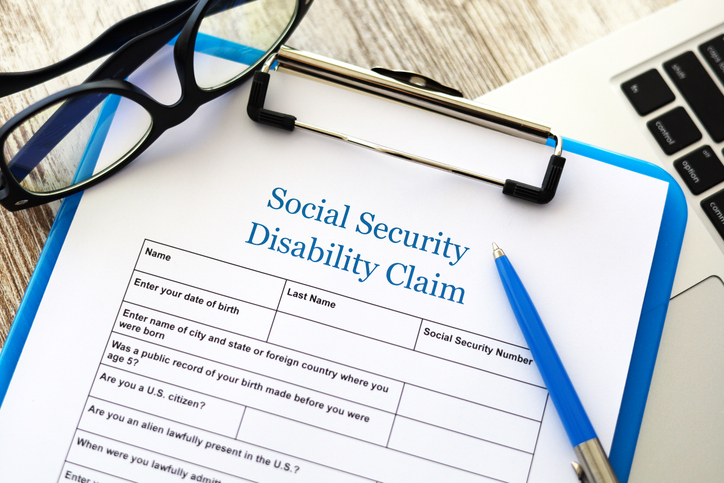How Kennon Law Can Help With Your Social Security Disability Denied Claim
You’re disabled and filed a claim for Social Security Disability Insurance (SSDI) or Supplemental Security Income (SSI) benefits. You received a denial letter, and wonder what to do. Don’t worry: You can appeal, and a Social Security disability denied claims attorney can assist.
Kennon Law Group has developed a reputation as the best Social Security disability denied claims attorney in Florida. We represent clients in the appeals process to receive Social Security Disability benefits. When reviewing your case, we’ll go over your initial claim to identify potential errors or missing information.
Never get discouraged if your SSDI or SSI claim is denied – up to 70% are denied the first time. Our Social Security disability denied claims law firm can determine your legal options and handle your appeal.

Denied Social Security Disability Benefits? You’re Not Alone
A denied SSDI claim from the Social Security Administration (SSA) can be discouraging, but don’t give up hope. Rejection is common initially, but many applicants successfully obtain benefits via appeals or reapplication. Knowing the reasons for denials and taking the necessary actions afterward can help you stay motivated and persistent.
Denial Isn’t The End
First, an initial application denial doesn’t mean you’re ineligible for benefits or that your condition isn’t serious; it’s important to remember this. The SSA uses strict standards to assess disability claims, frequently denying initial applications due to incomplete records, weak medical evidence, or mistakes.
The SSA might determine that your medical records inadequately reflect your medical condition severity and its impact on your work capacity, for instance. Sometimes, applicants didn’t give enough detail on their work history or daily challenges. You can often address these issues through an appeal, strengthening your case with extra evidence and clarifications.
Kennon Law SS Disability Attorney Can Appeal For You
Don’t lose heart; the appeals process allows you to make repeated attempts to prove your eligibility. After a rejection, you may appeal for reconsideration; if this is also denied, you can request a hearing with an administrative law judge (ALJ). Hearings give applicants their best chance at success; they can present their case in person, participate in a Q&A session, and submit updated medical records or expert testimony.
SSA data show a high approval rate for disability claimants who reach a hearing, particularly those who have legal counsel. With help from an experienced disability attorney at Kennon Law, you can successfully navigate the appeals process, gather strong evidence, and build a compelling case that meets the SSA’s standards.
Finally, persistence pays off. Persistence and seeking assistance ultimately led many initially rejected SSD applicants to win their benefits. Navigating legal complexities is easier with Kennon Law; their experienced Social Security disability denied claims law firm offers expert guidance and helps prevent common pitfalls.
What’s the Difference Between SSDI and SSI—and Which One Applies to You?
For those unable to work, the Social Security Administration (SSA) provides Social Security Disability Insurance (SSDI) and Supplemental Security Income (SSI). The best program for you will depend on factors such as your work experience and the type of disability you have.
Social Security Disability Insurance (SSDI)
Social Security Disability Insurance (SSDI) provides benefits for individuals who have earned sufficient work credits through employment and payment of Medicare and Social Security taxes.
Eligibility is generally determined by whether you worked 5 of the last 10 years, earning at least the minimum amount set by the SSA. If you meet this criterion, you are likely eligible for SSDI benefits. To confirm eligibility and estimate your benefit amount, review your annual Social Security earnings statement provided by the SSA, which details your prior earnings.
Supplemental Security Income (SSI)
Supplemental Security Income (SSI) offers benefits to people with limited work history, children, or no Social Security contributions. This program prioritizes aid for individuals facing significant financial difficulties.
SSI eligibility and payments are determined by a combination of an individual’s financial resources, household income, and other income. The Social Security Administration (SSA) adjusts its limits on household income and assets annually.
Those with incomes or assets above the limits may lose their SSI benefits, even if they are medically disabled. To understand how these thresholds apply to your situation, it’s essential to review the SSA’s current guidelines.
Challenging a Denial of Social Security Disability Benefits
While rejection of your SSDI claim can be discouraging, it’s common and not necessarily final. Many initial applications are rejected by the SS due to stringent eligibility requirements, frequently citing insufficient medical evidence, incomplete documentation, or technical errors.
Don’t give up; view denials as opportunities to improve your case through the appeals process’s multiple stages, proving your eligibility and securing the needed benefits. Our attorneys at Kennon Law Group represent clients throughout each phase of the SSA appeals process:

The Denied Social Security Disability Appeals Process
Reconsideration
To appeal a denial, you must request reconsideration within 60 days of receiving the denial letter. In this phase, another SSA reviewer will review your claim again, considering any new evidence. To boost your success rate, collect thorough medical records, such as recent test results and doctor’s notes, to clearly show how severe your condition is and how it affects your work.
In addition, describe the effects of your disability on your daily activities and amend any errors in your original application. While a comprehensive, well-documented reconsideration request may sometimes result in approval, many claims are again denied at this stage.
Hearing Before an Administrative Law Judge (ALJ)
Should your reconsideration be denied, you must then request a hearing from an administrative law judge (ALJ) within 60 days. Often, the most important part, this stage allows for in-person or virtual case presentations, Q&A, and further evidence submission. Consider working with an experienced Social Security disability denied claims attorney, like those at Kennon Law – it could make a significant difference.
An attorney can help you gather strong evidence, prepare for your hearing, and clearly explain how your condition impacts your ability to work. SSA data reveal greater approval rates at hearings, especially for represented claimants.
If your appeal is denied during the reconsideration process and benefits are not granted, you may request a hearing before an Administrative Law Judge (ALJ).
Our Social Security disability denied claims law firm will thoroughly review all documentation in your Social Security Administration (SSA) case file and prepare to represent you at the hearing. Hearings are typically scheduled within two years of the date you request them.
Review by the Appeals Council
If you disagree with the Administrative Law Judge’s (ALJ) decision, you can request a review by the Social Security Administration’s Appeals Council within 60 days of receiving the decision.
The Appeals Council may remand your case to the ALJ for further review, issue an independent decision, or deny the request if no errors are found.
Review by the Appeals Council
If you disagree with the Administrative Law Judge’s (ALJ) decision, you can request a review by the Social Security Administration’s Appeals Council within 60 days of receiving the decision.
The Appeals Council may remand your case to the ALJ for further review, issue an independent decision, or deny the request if no errors are found.
Importance of Medical Evidence in the Appeals Process
Strong medical evidence is crucial for a successful SSDI appeal, directly backing up your disability claim and inability to work. Throughout your appeal, reconsideration, ALJ hearing, Appeals Council, or federal court proceedings, the SSA uses objective medical evidence to assess the severity, duration, and effects of your condition. Approval hinges on well-organized, comprehensive medical evidence that provides credible, verifiable support.
To strengthen your disability appeal, make sure your medical records are complete, current, and directly relevant. Your Social Security disability denied claims attorney will assist with collaboration with your doctors to obtain detailed reports that connect your health issues to your limitations. The SSA favors verifiable evidence; thus, flawed records harm your claim. Focusing on solid medical evidence improves your chances of success throughout the SSDI appeals process.

Benefits of Working with a Florida Social Security Disability Denied Claims Lawyer
Your experienced social security disability claim attorney will assist your case in these ways:
If your Florida disability claim has been denied, the case isn’t over. Please call our disability benefits claims attorneys at Kennon Law Group today at (888) 878-4267.
Frequently Asked Questions
Most Social Security Disability Insurance initial applications – around 65–70% – are denied due to the strict eligibility criteria and procedural challenges of the Social Security Administration. The SSA requires comprehensive, objective medical documentation to prove a disability prevents substantial gainful activity (SGA) for at least 12 months or results in death. Many initial applications lack detailed records, such as physician reports, diagnostic tests, or treatment notes that link the condition to functional limitations.
If your Social Security Disability Insurance claim is denied, you have options to challenge the decision through the Social Security Administration’s appeals process or, in some cases, start over with a new application. The appeals process is mentioned above, and your SSDI attorney can assist you.
You must meet strict medical and non-medical qualifications to qualify for disability. Common reasons for disqualification are insufficient medical evidence, condition not severe enough, engaging in substantial work activity, and insufficient work credits.
Testimonials
Awards & Honors



Contact us now
Have questions or need legal assistance? Contact Kennon Law today for expert guidance on personal injury and insurance claims.
